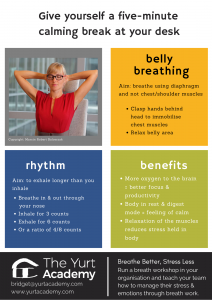Boosting Stress Resistance at Work
Ever seen the deer in Richmond Park? The large family herds are impressive. Famous in fact. Instagram worthy. On a selfie quest, park visitors sometimes spook the herd. In unison, the deer flee to safety. A few minutes later, you’ll see them regrouped and grazing happily under a tree.
As mammals, humans are also designed to flee in the face of danger. We are no longer always switching into fright and flight mode to escape a predator but we still react to stress signals received through our senses. A boss who shouts at us, a noisy open workspace, the sight of a messy desk, squeezing onto a crammed tube train.
We all recognise the main physical signs of stress. We feel our heart race, our breath quicken, our body flood with hormones. The problem with our modern lives is that, unlike the deer, we don’t get to escape to safety. Our workday and commutes can keep us in a state of permanent stress.
External and internal stress
I think of the above stress as external, we are reacting to a perceived immediate threat and our emotional state is fear. Then there is internal stress. This is when our mind manufactures anticipated threats and our emotional state is anxiety. That boss who was berating you keeps on doing so in your thoughts. On a loop.
Our primitive brain, which sets off the stress alarm, cannot tell the difference between fear and anxiety. Both your actual boss shouting at you and your anxiety about your boss doing it again trigger a stress response in the body.
Using the body to lead the mind
In times of stress, we need to use our body to override our primitive brain. Our breathing, the only function of the Autonomic Nervous System that is both voluntary and involuntary, can help us do that. By voluntarily controlling our breathing, by slowing it down, we can bring our body out of the stress response and back into rest and digest mode. (See exercise below).
Each time we break the stress loop, we invest in our wellbeing. Studies show that long-term (even low-level) stress has a negative impact on our immune system, sleep patterns, digestion, mental health and enjoyment of work and life. Once we have dealt with the physical stress response, we are better equipped to deal with the triggers that brought it on.
Taking your body to a place of safety
One way we can boost our stress resistance at work is to build breathing breaks into our day. Don’t wait for a stressful episode to take a breathing break, make them an integral part of your work routine. These breaks tell the body we are in a place of safety – the equivalent of the deer grazing under a tree after fleeing those pesky Instagrammers.

If you’d like to organise for the Yurt Academy to deliver a Breath Better, Stress Less workshop in your organisation, please get in touch.

